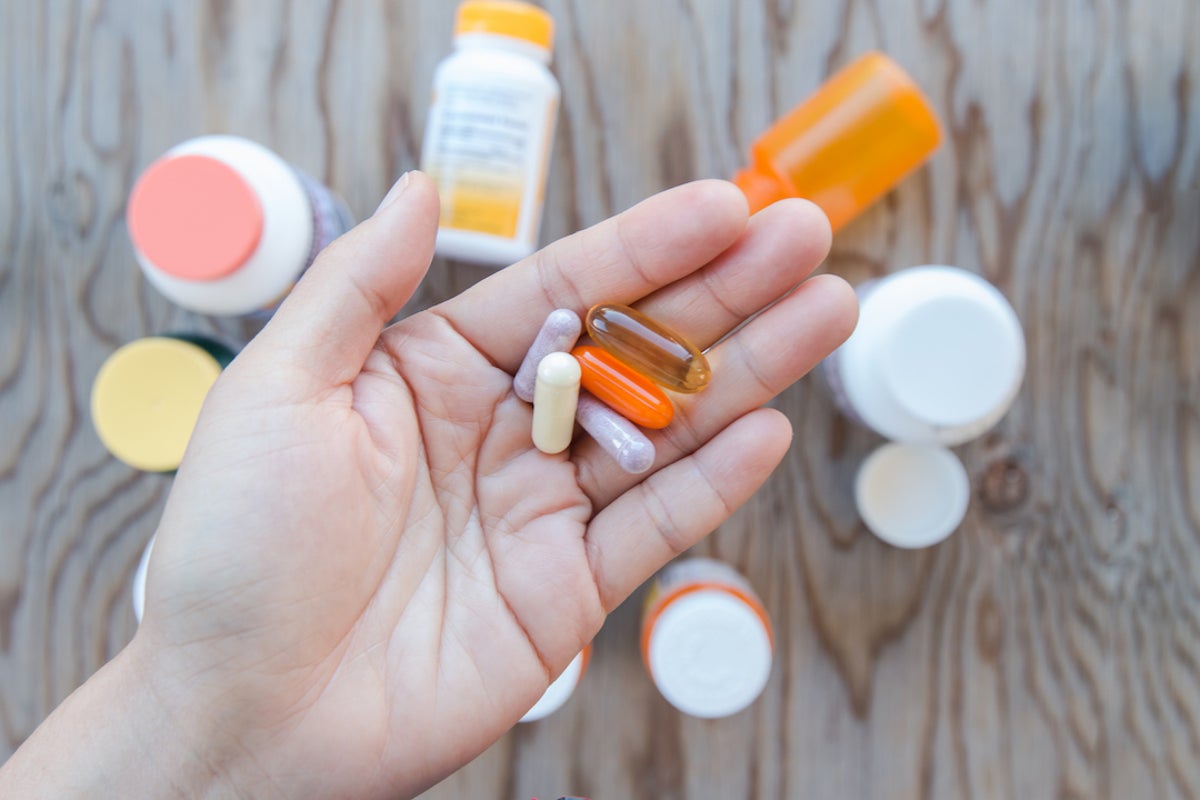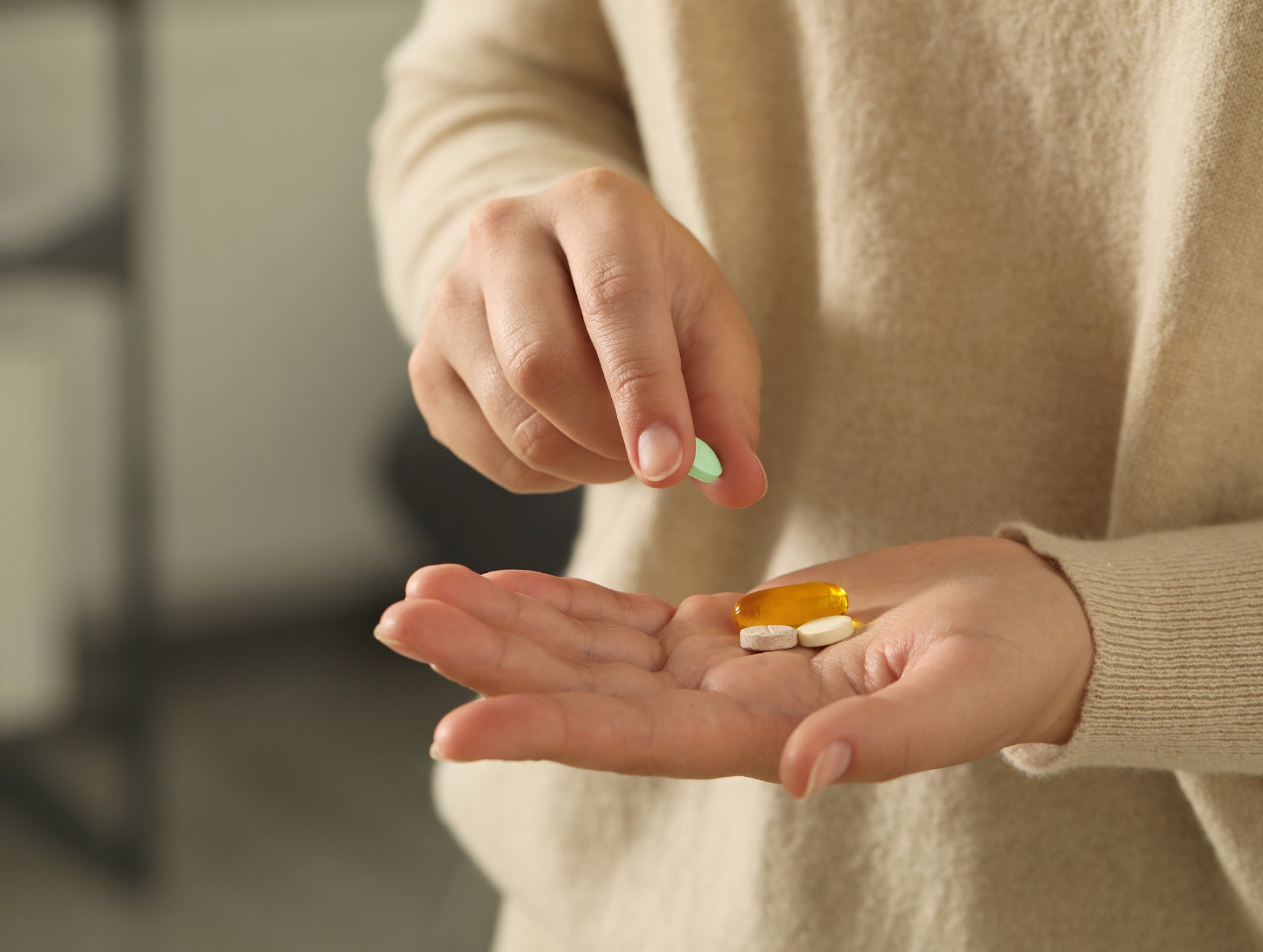
If you’ve recently scrolled on social media, listened to a podcast, used public transport or stepped into a shopping centre, you’ll likely have seen ads for supplements. These attractively-packaged health fixes are everywhere and they offer a range of benefits – from improved gut health to better sleep.
The supplement market has never been more saturated and while it’s promising that so many products are now available to help us lead healthier lives, the sheer volume of what’s on offer can, at best, cause confusion.
At worst, you might end up like the woman who recently went viral for saying she relies on her “body’s frequency” to choose supplements for her kids. If you’re not one to make random selections for your family based on “the vibe”, you’re probably on the right track – but how can the average person tell if one supplement is any better than another?
The supplement market is one of the more unregulated industries, which means false claims, dodgy data and questionable sponsored content can deceive even the most scrupulous consumers. From gummies that contain very little of the nutrients they propose to deliver to “hormone-balancing” wonder pills, there are plenty of scams in the world of supplements.
“One of the biggest risks today is misinformation on social media,” explains GP and spokesperson for SafeSupp Dr Amos Ogunkoya. “A worrying 39 per cent of people in the UK – rising to 60 per cent amongst those aged 25-34 – turn to influencers and online sources for supplement advice.”
“Social media is filled with misleading claims, unverified advice, and influencer promotions that focus more on engagement than evidence. Many supplements pushed online lack clinical research, and some influencers promote unsafe or unregulated products for financial gain, often without declaring sponsorships,” says Dr Ogunkoya.
Misinformation aside, there are actually plenty of quality products that can, when taken in the correct doses, have a significant impact on your health. Remember when everyone suddenly started taking magnesium? This was following a study that showed women were more likely to be deficient than men. Vitamin D? The UK received a public health announcement on that one because, due to limited sunlight in the British Isles, we could all benefit from a dose and the best way to get it was via supplements. In the early aughts we received similar health advice regarding fish oils for brain health, particularly if we weren’t getting enough oily fish from our diets.
Supplements can be brilliant tools, provided we’re making the right choices about the quality and quantity of what we’re taking. Below, we’ve laid out an expert guide to help you make sense of supplements, choose the right products and spot misinformation online.
Read more: Menopausal women spending average £1,800 a year to combat symptoms
How to choose supplements
Look for third party testing
Third party testing makes a difference because it means your supplement has been tested by an independent company that isn’t on the supplement company’s payroll. You can usually find confirmation that a product’s claims have been independently tested on a brand’s website or on a supplement’s packaging.
“Look for third party testing or a certificate because it’s really important to make sure it’s tested by an independent body. Make sure the brand is really transparent about the ingredients, and that the supplements don’t contain things such as ‘propriety blends’,” says Dr Ogunkoya
Ashley English is a nutrition expert and head of product development at HTC Health. He explains that while it’s important to look for brands that conduct third-party testing, it’s also important to verify these claims. “Brands can present misleading information until regulated by Trading Standards. It’s also good to look out for a Good Manufacturing Practices (GMP) certification as an indicator of quality.”
Check for ‘proprietary blends’
A proprietary blend might sound like a specialist formula that’s likely to be a cut above the rest, however, brands often use this term to get away with not disclosing exactly what’s in a supplement.
“It’s a common marketing trick and one of the biggest red flags on a supplement label,” says Dr Ogunkoya. “Brands include small amounts of beneficial ingredients to make their product seem impressive while filling the rest with cheap, ineffective substances. If a supplement isn’t transparent about dosages, you have to question how effective it really is.”
Fillers, bulking agents and additives
Supplements, especially in pill form, usually contain some type of bulking agent or filler to help achieve a uniform shape and size. These ingredients are inactive and won’t harm you, but if you’re taking a lot of supplements, in large doses, they could upset your gut.
“Brown rice flour is one of the worst offenders – often used to pad out capsules, despite having no nutritional value,” says Dr Ogunkoya. “Depending on its source, it may also contain traces of arsenic. Then there’s magnesium stearate and silicon dioxide, which are added to prevent ingredients from clumping together. While they might make production easier, magnesium stearate can reduce nutrient absorption, and the long-term effects of silicon dioxide aren’t fully understood. A high-quality supplement simply doesn’t need these additives.”
Many supplements also contain artificial colours, sweeteners and flavourings to make them more appealing. Gummy supplements are one of the worst offenders when it comes to added colours and sugars.
“Artificial colourings, like Red 40 and Yellow 5, have been linked to hyperactivity in children and potential cancer risks in some studies,” warns Dr Ogunkoya. “Sweeteners, such as aspartame and sucralose may disrupt gut bacteria, affect insulin levels, and cause digestive issues. Titanium dioxide, used to whiten supplement capsules, has already been banned in some countries due to concerns over its links to gut inflammation and DNA damage. If a supplement is full of artificial additives, it’s a sign that quality isn’t the priority.”
Joe Netherwood, of supplements brand Known Nutrition, adds: “In the UK, all ingredients should be listed in order of volume – largest to smallest – and most non-active ingredients should have a function. For example ‘gelling agent (Pectin)’ or ‘colour (anthocyanin)’.”

Ingredient green flags and red flags
There are several ingredients you can look out for on ingredients labels that are considered to be red flags by experts. We’ve listed some of them below to give you an idea of what to check for when you look at a label.
Magnesium stearate
Magnesium stearate is normally used as a filler agent. It can impact the body’s ability to absorb nutrients and is also known to cause issues with IBS. Studies have shown that if you take a tablet when taking magnesium stearate, it can reduce absorption. It’s not inherently harmful but because it offers no health benefit, it should just be avoided.
Silicon dioxide
Silicon dioxide is a caking agent. If the production is poor, it may contain microplastics and nanoparticles which can accumulate in the body’s tissues. It’s unlikely to be dangerous, but it’s obviously unnecessary.
Guar gum
Similar to magnesium stearate, guar gum is known to cause bloating and digestive discomfort. Some studies have shown that it can slow down the movement of food through the digestive system.
Brown rice flour
Brown rice flour is a cheap filler without any nutritional value, and there is often some contamination with other products such as arsenic, which is obviously poisonous and an irritant. If you’re taking a lot of supplements that contain brown rice flour over a period of several years this could possibly impact your health.
Artificial colours, flavours and sweeteners
Artificial colourings, like Red 40 and Yellow 5, have been linked to hyperactivity in children and adults and some studies show a link with potential cancer risks.
We now know that artificial sweeteners such as aspartame can disrupt the gut microbiome. They can worsen insulin resistance and cause metabolic disease. Sucralose has been shown to alter gut bacteria and we now know how important gut and brain function is for our overall health. If your gummies are full of sugar, throw them out.
Titanium dioxide
Titanium dioxide is banned by the EU because it accumulates in cells and causes damage to DNA. It’s used as a whitening agent for tablets and gives them that bright shiny finish. If you’re buying your supplements online from places outside of the UK and EU, be sure to check the label.
Hydrogenated oils
Hydrogenated oils are trans fats that can be found in supplement capsules and are often used in softgels. There are good types of fat but trans fats can have an detrimental impact on your cholesterol levels, and can lead to increased risk of heart attacks and systemic inflammation. If your cholesterol is a cause for concern, avoid these ingredients in your supplements.
Carrageenan
Carrageenan is derived from red seaweed and has been known to cause gut inflammation and digestive distress. There have been some studies that have shown that it can worsen IBS and colitis due to it increasing gut inflammation.
Gelatin
Gelatin is used in capsules and is less common now that most people look for supplements that are vegan-friendly. Poor quality gelatin is generally linked to poor quality farming, where animals are fed with toxins and antibiotics. If the source is unspecified it may be linked to low-quality or non-sustainable farming practices, so you should avoid in these instances. It’s also not suitable for vegetarians or vegans.
Read more: Best multivitamins for women, men and children, according to experts
Taking the right dose
Supplements often boast that they offer 100 per cent or more of your recommended daily dose. Ideally, you’d be getting all the nutrients you need from your diet, but many people take supplements to top up or because they have a medical condition that causes deficiencies or prevents the uptake of nutrients.
A supplement should never exceed your recommended daily intake and you should always check the label to find out what dose you’re taking. There are brands that can offer a complete analysis of your health and make recommendations on exact doses, and a visit to your GP for a blood test or a consultation with a nutritionist can help shed light on how much of something you should be taking, too.
Optimal doses are evidence-based but many studies have been done on male bodies which means that in some cases, supplements offer an average dose that might not be suitable for everyone. This is why you may see tailored multivitamins for women or specialist menopause supplements – these take into account the specific needs of particular bodies.
“It really does depend on the individual,” says Dr Ogunkoya. “If you’re not deficient in any nutrients, then your body can, and will, eliminate most of them, but there are some that can potentially accumulate in tissue, such as Vitamins A, D, E and K – so avoid taking them unless you actually need them. Minerals such as iron and zinc can also accumulate, and if they do this they can cause harmful effects on the body.”
He adds: “Some combination supplements are really well formulated, such as magnesium glycinate, which is really good for sleep. But some you need to check the dosages for, as they’re just proprietary blends that will offer no real benefit, and some ingredients actually interact negatively with each other. Things like magnesium at high doses we actually use in medicine as a laxative to cause diarrhoea. While iron can cause constipation.”
Is a supplement better if it costs more?
Luxury supplements are everywhere and their branding is incredible. However, just because something looks great on the shelf, doesn’t necessarily mean it’s any better for you than a cheaper supplement. You could invest hundreds of pounds a month on supplements and experience the same effects as you would from spending £20 – it really depends on the quality of the ingredients and your specific needs and deficiencies.
If a supplement is third party tested this might affect the cost as this kind of testing is expensive. Fancy branding and celebrity affiliations can also affect the cost of supplements.
Ingredients will also factor in. There are different types of magnesium, for example. Some are cheaper because they’re less absorbable. You might also be paying for a lower dose and more additives and fillers, so always check the label.
“Magnesium citrate is more bioavailable than magnesium oxide. However, the internet makes it easy for brands to mislead consumers. Some may claim high levels of active ingredients when, in reality, the product contains far less,” says English.
The best supplements are transparent, well-researched and free from unnecessary additives so take these things into consideration before you think about the cost. You can also look out for ingredients you know are of a certain quality, like patented ingredients. These include the likes of KSM-66 ashwagandha and pureway-C Vitamin C.

How long will it take for a supplement to work?
Experts advise taking a supplement for between one and three months while tracking your symptoms and the way you feel so that you can be sure of any changes. However, results really depend on the type of supplement you’re taking.
“You’ve got things like caffeine and electrolytes, which are supplements that affect you really quickly in a matter of hours or days,” says Dr Ogunkoya. Then you have some that take four to eight weeks to work, such as most vitamins, iron and magnesium – with these you’ll only see noticeable results after continuous regular use. Some things you need to take for months to see any effects, such as Omega-3.”
“I’m not a fan of just taking supplements for the sake of it or blindly, so do make sure you need whatever you’re taking so you don’t actually end up causing yourself harm. If in doubt, take a blood test before and after taking a supplement so you can see if it’s benefiting you.”
You should also be mindful of when you’re taking your supplements. Some are best taken in the morning, some work best with food for absorption, others are better on an empty stomach. Make sure you read the guidance so you get the best bioavailability and aren’t wasting your money.
How to understand a supplement label
Labels can be confusing, especially when they’re full of terminology you might not understand. A supplement label should always show ingredients, nutritional value and recommended daily dose, as well as directions for use.
“Lack of clear and easily accessible information is a major warning sign,” says English. “In the UK, nutritional information must be presented in a standardised format, as followed by top retailers like Boots and Holland & Barrett. If a label looks noticeably different from what you'd find in these stores, it’s best to avoid that product.
“Food supplements must comply with regulations that set maximum daily dosages to ensure consumer safety. Always follow the recommended serving size and be mindful of potential interactions with medications or existing health conditions. If you have experienced recent health changes, pregnancy, or a medication change, it’s important to consult a health professional before taking a new supplement.”
Netherwood advises shoppers to “look for clear and compliant information which shows the brand is actively working to meet and is paying attention to the UK regulations.
He says: “Look closely at the table of active ingredients, in the UK (and EU) the regulations are to include the amount of each active ingredient per serving, as well as the Nutritional Reference Value (NRV) for the most common vitamins and minerals. Food supplements do not have to give macronutrient information (protein, carbohydrates, fats etc.), if they do, it may indicate the product has been created for another country and may not be compliant in the UK.”
In the UK, regulated supplements must meet strict safety and labelling standards set by the Food Standards Agency (FSA) and MHRA. This ensures they contain safe, accurately dosed ingredients and comply with Good Manufacturing Practices (GMP).
“Unregulated supplements, often bought online or imported, aren’t subject to these checks,” explains Dr Ogunkoya. “This means they can contain incorrect dosages, banned substances, or harmful contaminants without consumers realising. Many also use proprietary blends to hide ingredient amounts, making it difficult to know exactly what you’re taking.”
To stay safe, always buy from reputable brands, check for third party testing and read the ingredients label thoroughly. You can also use tools like the SafeSupp app to verify what’s really in your supplements. The best port of call is checking in with a GP or health professional to find out what your body really needs. Only 26 per cent of people in the UK do this, which leaves those that don’t open to incorrect dosage, poor quality products and taking supplements they don’t really need.
Read more: As a fitness expert, here are the seven habits that have made the biggest difference in the gym
13 best gut-health drinks, from kefir to kombucha
7 best vitamin D supplements to help boost your health and immunity
The best collagen supplements to take, as recommended by experts
Why your wellness supplements might be ruining your gut health
Why fitness apps could be doing more harm than good
If you want a better Hyrox time, expert says you should do these 5 things on race day
Is the rise of endurance sports healthy – or a dangerous addiction to adventure?







